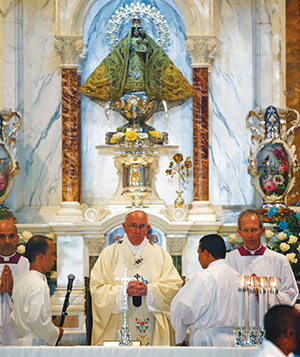
HAVANA – The Cuba that Pope Francis touched down on Sept. 19 is a nation in transition, caught between a past that is no longer tenable and a new future that many here fear as much as desire.
It is also a Cuba of contradictions and paradoxes generated by the Communist government’s attempt to introduce capitalist reforms and greater openness while clinging to an authoritarian one-party state.
Nowhere are its uncertainties more obvious than in the official policy toward the Catholic Church.
Raúl Castro in May told journalists that he followed what the pope said and wrote, and that if Pope Francis carried on like he was, the communist leader would go back to Mass and start praying.
Journalists assumed he was joking, but the Jesuit-educated family man who has statue of the Virgin of El Cobre – Cuba’s national devotion – in his office, made it clear he wasn’t.
Yet the official view of the Church here is caught between seeing it as a rival to the state that must be controlled and restricted, or a partner in the building of Cuba’s new future.
Just like the rest of Cuban society, the Church continues to be heavily controlled. The Cuban bishops can only officially relate to the government via the Bureau of Religious Affairs, which sits within the ideological department of the Central Committee of the Communist Party.
The Church, too, is tightly watched. Almost every church group here is infiltrated by informers, and emails and phone calls are scrutinized.
Despite these obstacles, the Church has been playing a growing role in Cuban society, tending to the homeless and the elderly. The state’s traditional ambition to provide for the cradle-to-grave needs of every Cuban has given way in recent years to a recognition that other, non-state actors have a part to play.
The Church is playing a particularly strong role in one area that has traditionally been the strict preserve of the state. Across Cuba, Catholic ‘cultural centers’ are offering classes in business management, ethics and humanities. There are five in Havana alone, including two run by the Jesuits and the Dominicans.
The courses are practical, underpinned by Christian values and Catholic social teaching, but
do not proselytize. “People respond to our courses because they know that we do is well done and of a high standard, and are flattered to be invited,” explains Gustavo Andújar, director of the Félix Varela Cultural Center in Old Havana, where on Sunday afternoon, Pope Francis addressed hundreds of young people.
The Loyola Center for Faith and Culture, run by the Jesuits, recently gave a course on Pope Francis’s ecology encyclical, “Laudato sí,” where one of those attending was a government official from the Metereology Department who had come to learn about climate change.
The Félix Varela center, named after an early 19th century priest famous for his works on Cuba’s ethics and identity, offers courses for Cubans wanting to set up and run small businesses, mostly linked to tourism.
People attending the Cuba Emprende workshops have gone on to set up businesses offering traditional Cuban cuisine in so-called paladares, or making artisanal soaps. The course covers topics like how to market a product, the importance of re-investing in a business, or making a tax declaration.
Insist on Human Treatment
CubaEmprende explicitly teaches the ethics that must underpin private enterprise. More than half a million Cubans are now privately employed – and often face inhumane work conditions. “They often have no vacations, or work ridiculously long hours without weekly breaks,” says Andújar. “We insist on the human treatment of people.”
It is that extra element of values that the state cannot offer.
The government recognizes that Cuban society is suffering a moral crisis, that the ethical legacy of the Castros’ generation has now all but disappeared among the young.
Yet the state’s attempts to inculcate “values” has been a failure, not least because the atheism behind those values is shared by less than 15 per cent of the population.
Cuba may have low rates of religious practice, a legacy of decades of religious persecution and restricted numbers of clergy (there are currently around 400 priests serving 700 churches in a population of 11 million). But they are overwhelmingly believers, and a majority describe themselves as Catholic.
That means there is only one obvious source of moral regeneration in Cuban society. But while the Church is happy to be given freedom to exercise its mission, it is wary of becoming a kind of Ministry for Morality. The renewal of Cuba’s values must be accompanied, the bishops say, by an expanded civil society in which institutions are free to organize and promote their worldviews.
“The paradox in Cuba is that this is a country with the perfect conditions for a really vigorous civil society, because there are so many well-educated and well-trained people,” says Andújar, who believes that greater freedom in areas like education and values will help to create a more dynamic private sector.
